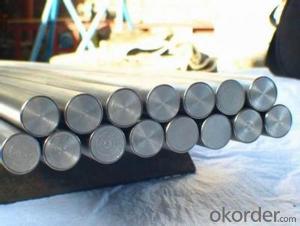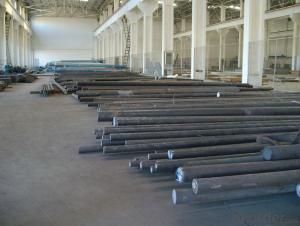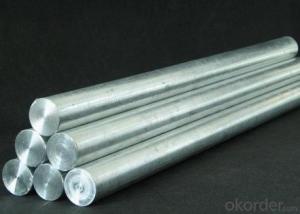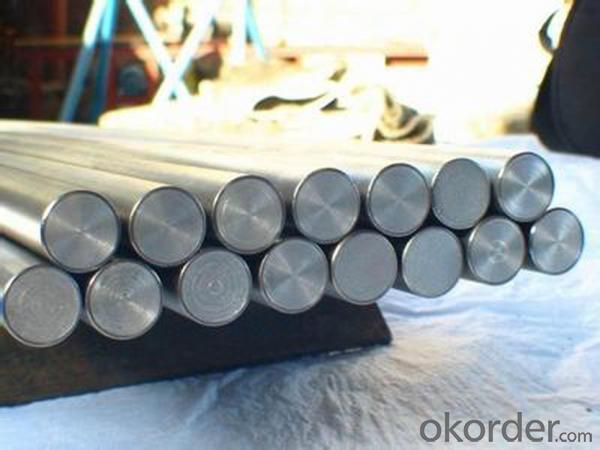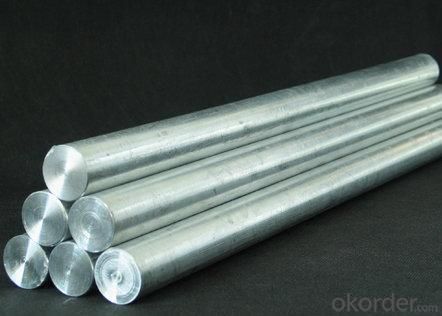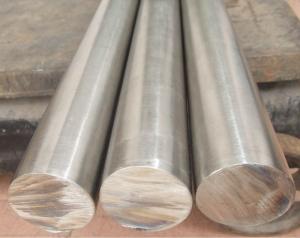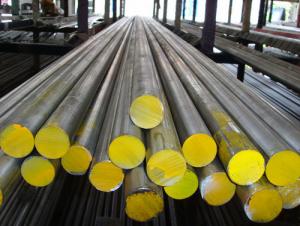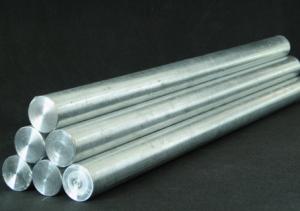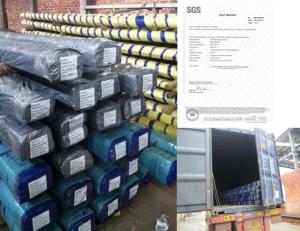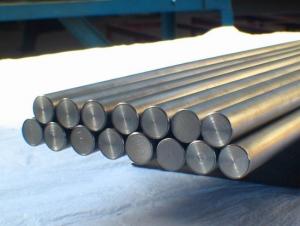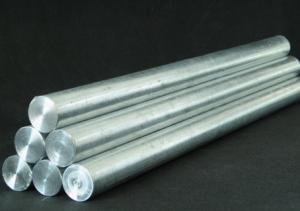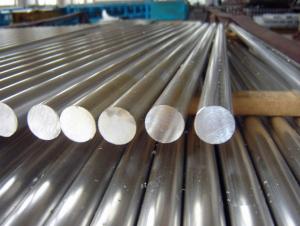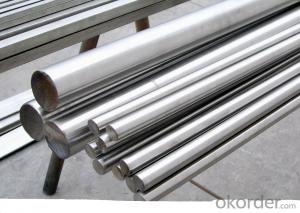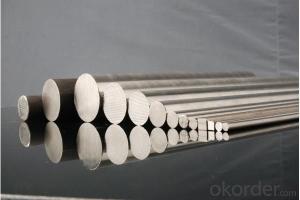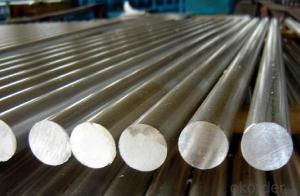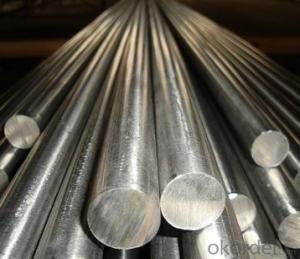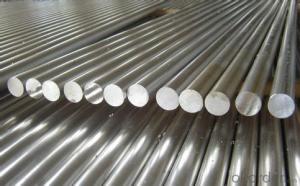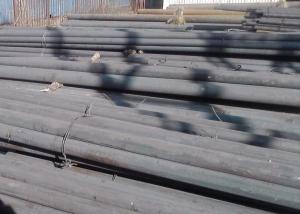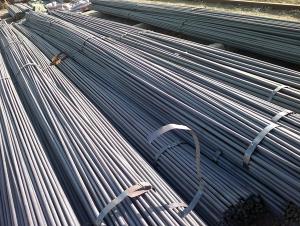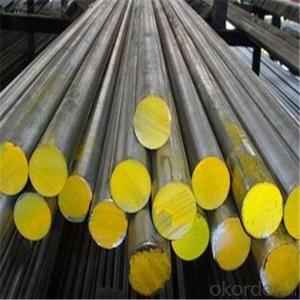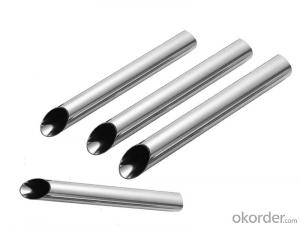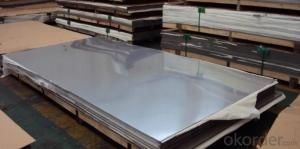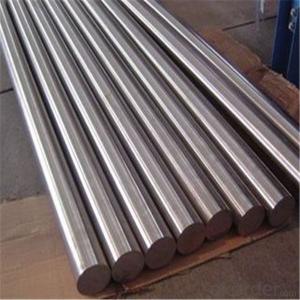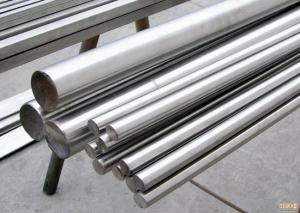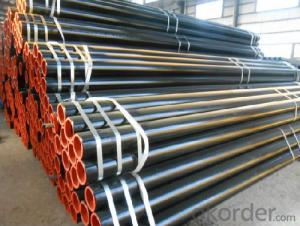Stainless steel round bar; high quality
- Loading Port:
- Guangzhou
- Payment Terms:
- TT OR LC
- Min Order Qty:
- 50 m.t.
- Supply Capability:
- 10000 m.t./month
OKorder Service Pledge
OKorder Financial Service
You Might Also Like
Quick Details
| Standard: | JIS,AISI,ASTM,GB,DIN | Dimensions: | 316 | Grade: | 300 Series |
| Place of Origin: | China (Mainland) | Brand Name: | CNBM | Model Number: | 316 |
| Type: | Round | Application: | Construction | Shape: | Round |
| Certification: | ISO | Steel Grade: | 300 Series |
Packaging & Delivery
| Packaging Detail: | in bundle |
| Delivery Detail: | depend on the quantity, but the earliest time will be 15days |
Specifications
AISI316 stainless steel round bar
surface finish:bright and polished
Moq:5tons
Delivery time within 15days
Product name | AISI304 stainless steel round bar |
Standard | GB JIS ASTM AISI DIN ect |
Material | AISI 202 202 304 304L 316 316L 321 309S 310S ect |
Diameter | 20mm-3000mm |
Length | 6m length or as customer demand |
Used area | Our products are widely used in the architecture and engineering structure. |
Package | In bundles,or provide the special package as customer demand |
Certification | ISO9001.2000, Mill Test Certificate |
Thirdparty inspection | OMIC,SGS, as customer demand |
Remark | We can customer made for special requirement |
We have been specialized in the steel products for nearly14years old, we are sure to satisfy you with professional knowledge, competitive price,and fast service, if you are interested on us, pls never hesitate to contact with us directly.
- Q: Are stainless steel bars safe for drinking water applications?
- Yes, stainless steel bars are safe for drinking water applications. Stainless steel is highly resistant to corrosion, which helps prevent the leaching of harmful substances into the water. Additionally, stainless steel is non-reactive and does not release any odors or flavors that could affect the taste or quality of the water.
- Q: What are the advantages of using stainless steel bars in the oil and gas industry?
- Using stainless steel bars in the oil and gas industry offers several advantages. Firstly, these bars provide excellent corrosion resistance. Regular steel bars are prone to corrosion in the harsh environments of this industry, which can lead to structural integrity issues. However, stainless steel bars are highly resistant to corrosion, ensuring durability and longevity even in corrosive conditions. Secondly, stainless steel bars possess high strength and toughness, making them suitable for oil and gas applications. They can withstand extreme pressures, temperatures, and physical stresses, ensuring reliability and safety in critical operations. Moreover, stainless steel bars are non-magnetic, which is crucial for certain oil and gas procedures. Magnetic materials can interfere with processes like magnetic resonance imaging (MRI) or electromagnetic flow measurement. By using stainless steel bars, potential disruptions can be avoided, ensuring accurate and reliable measurements. Additionally, stainless steel bars are highly resistant to heat and fire. In an industry where high temperatures and fire hazards are common, using stainless steel bars enhances safety. They can endure intense heat and maintain their structural integrity, reducing the risk of accidents or structural failures. Furthermore, stainless steel bars are easy to maintain and clean. Their smooth surface prevents the accumulation of dirt, oil, or other contaminants, making them effortless to clean and maintain. This characteristic is particularly crucial in the oil and gas industry, where cleanliness and hygiene are vital for safe operations. Lastly, stainless steel bars are recyclable and environmentally friendly. With the growing emphasis on sustainability and reducing carbon footprint, using stainless steel bars aligns with these objectives. Stainless steel is highly recyclable, promoting resource efficiency and waste reduction in the industry. In conclusion, the advantages of using stainless steel bars in the oil and gas industry include excellent corrosion resistance, high strength and toughness, non-magnetic properties, heat and fire resistance, easy maintenance and cleaning, and environmental friendliness. These benefits make stainless steel bars the preferred choice for various applications in this industry, ensuring reliability, safety, and longevity.
- Q: What are the different types of stainless steel bars used in agricultural equipment?
- There are several different types of stainless steel bars used in agricultural equipment, including 304, 316, and 410 stainless steel. 304 stainless steel is commonly used for general-purpose applications, while 316 stainless steel is more corrosion resistant and often used in environments with high exposure to moisture or chemicals. 410 stainless steel is known for its high strength and durability, making it suitable for heavy-duty applications in agricultural equipment.
- Q: Can stainless steel bars be used in solar panel frames?
- Yes, stainless steel bars can be used in solar panel frames. Stainless steel is a durable and corrosion-resistant material, making it suitable for outdoor applications like solar panel frames. It provides structural support, withstands harsh weather conditions, and maintains its integrity over time, enhancing the longevity and performance of solar panels.
- Q: What are the different types of stainless steel bars used in marine environments?
- There are several types of stainless steel bars commonly used in marine environments, including 304 stainless steel, 316 stainless steel, and duplex stainless steel. Each type has its own unique properties and characteristics that make them suitable for different applications in marine settings.
- Q: What are the different types of stainless steel bar surface treatments for corrosion resistance?
- To enhance corrosion resistance, one can utilize various methods for treating the surface of stainless steel bars. These include: 1. Passivation: By employing acid solutions, iron contamination can be eliminated from the stainless steel bar's surface. This process facilitates the creation of a protective oxide layer that prevents corrosion. 2. Pickling: Using acid solutions, scale, rust, and other impurities can be eliminated from the surface of the stainless steel bar. This treatment enhances the material's resistance against corrosion. 3. Electropolishing: Through an electrochemical process, a thin layer of material is removed from the stainless steel bar's surface. This treatment not only improves corrosion resistance but also results in a smoother and more visually appealing finish. 4. Coating: Applying a protective layer on the surface of the stainless steel bar can enhance its corrosion resistance. This can be achieved through various methods like electroplating, powder coating, or painting. The choice of coating depends on the specific application and environmental conditions. 5. Nitric Acid Passivation: This process involves the use of a nitric acid solution to eliminate iron contamination and encourage the formation of a passive oxide layer on the stainless steel bar's surface. It provides excellent corrosion resistance in diverse environments. 6. Shot Blasting: By bombarding the surface of the stainless steel bar with small metallic or non-metallic particles, shot blasting effectively removes contaminants and creates a textured finish that enhances corrosion resistance. It is crucial to consider factors such as the stainless steel grade, intended application, and required level of corrosion resistance when selecting the appropriate surface treatment. Seeking advice from a materials engineer or corrosion specialist can assist in determining the most suitable treatment for a specific situation.
- Q: What are the manufacturing processes of stainless steel bars?
- Steel, forging, steel ingot, and electro slag, steel rolling, peeling, cold drawing, straightening, polishing, repair, and measuring the length of the cutting head wear, grinding head, finished product inspection and inspection, packaging and storage process
- Q: Are stainless steel bars suitable for chemical reactors?
- Stainless steel bars are indeed appropriate for chemical reactors. This particular type of steel alloy, known as stainless steel, boasts a chromium content of at least 10.5%, thereby endowing it with exceptional resistance to corrosion. Consequently, stainless steel bars are remarkably impervious to chemical reactions and the destructive impact of various substances employed in chemical procedures. Moreover, stainless steel demonstrates remarkable strength and resistance to heat, rendering it well-suited for enduring the elevated temperatures and pressures frequently encountered within chemical reactors. Furthermore, stainless steel is facile to clean and maintain, a vital aspect in safeguarding the purity and soundness of the chemicals undergoing processing. All in all, stainless steel bars represent a dependable and long-lasting choice for the construction of chemical reactors.
- Q: Can stainless steel bars be used in food preparation?
- Yes, stainless steel bars can be used in food preparation. Stainless steel is a popular choice for food-related applications due to its hygienic properties and resistance to corrosion. It does not react with acidic or alkaline foods and does not impart any taste or odor to the food being prepared. Stainless steel is also easy to clean and sanitize, making it an ideal material for bars, countertops, utensils, and other equipment used in food preparation. Additionally, stainless steel is durable and long-lasting, making it a cost-effective choice for commercial kitchens and food processing facilities.
- Q: Can stainless steel bars be used in pulp and paper mills?
- Yes, stainless steel bars can be used in pulp and paper mills. Stainless steel is highly resistant to corrosion, making it suitable for use in environments with high moisture and chemicals, such as pulp and paper mills. Additionally, stainless steel's strength and durability make it a reliable choice for various applications within these mills.
Send your message to us
Stainless steel round bar; high quality
- Loading Port:
- Guangzhou
- Payment Terms:
- TT OR LC
- Min Order Qty:
- 50 m.t.
- Supply Capability:
- 10000 m.t./month
OKorder Service Pledge
OKorder Financial Service
Similar products
Hot products
Hot Searches
Related keywords
